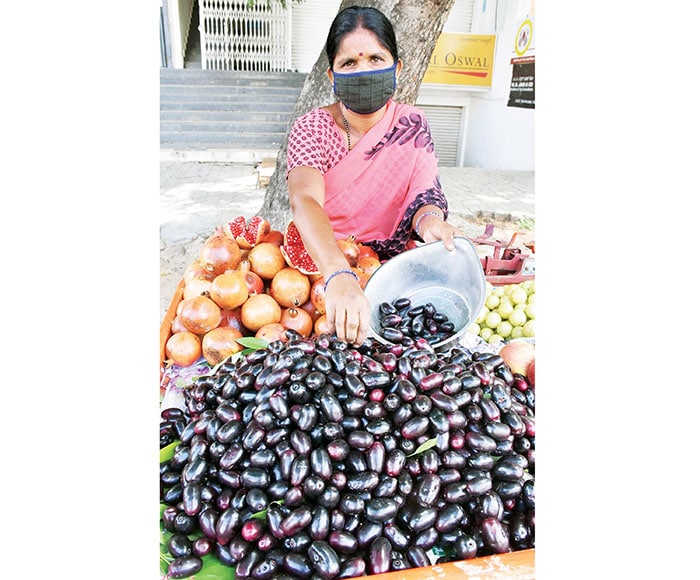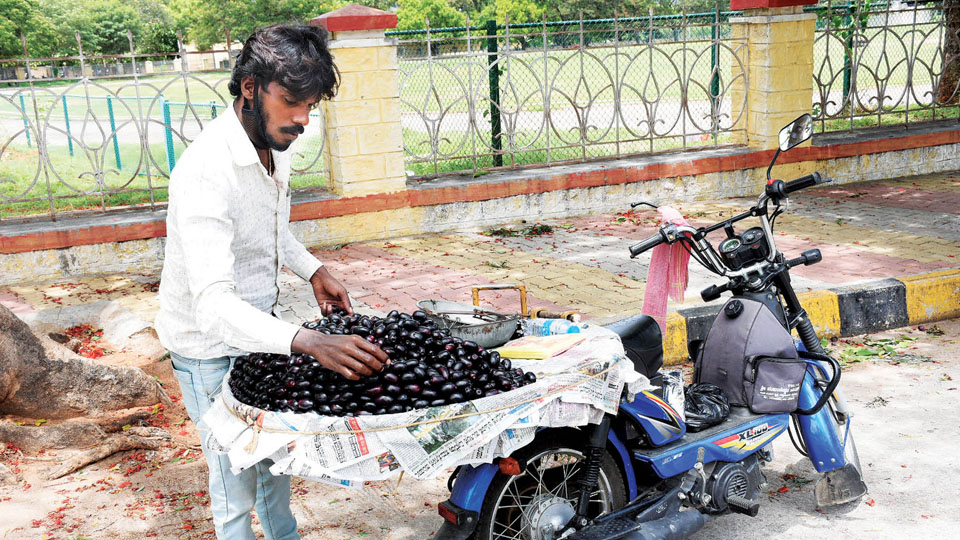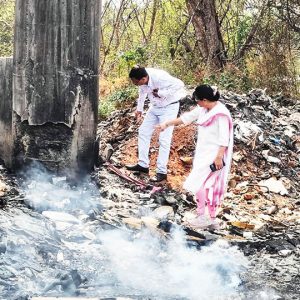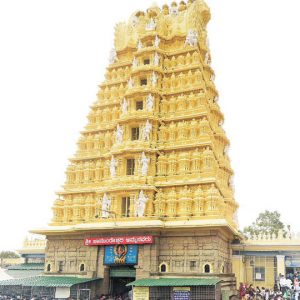By M.B. Pavan Murthy
Nutritionists say “a cherry a day keeps COVID at bay.” What’s happening in Mysuru is just opposite: COVID is keeping cherries at bay.
This is the season when loads of juicy and ripe ‘Nerle Hannu’ or jamun fruit come to Mysuru and this is the time of the year when mouths and tongues turn dark blue as Mysureans hog on this fruit as if there is no tomorrow. However, this year the Coronavirus pandemic has robbed the residents an opportunity to savour these fruits.
The viruses (many variants) per se, threat of infection, COVID-induced lockdown and a short market window from 6 am to 10 am have all contributed to dip in sale. Even vendors are a harried lot with no sales. Every year, they used to carry jamun trays full of alluring and neatly arranged fruits on their cycles and stand at vantage points and where people usually crowd. Some enterprising vendors always keep salt and chilli powder with them for buyers to experience that special taste.
Usually, they stand under shady trees on Kalidasa Road (Panchavati Circle) from the start point till the MUDA Complex and a few of them enter lanes and by-lanes to sell the fruit. Their usual target is people who are headed homes from their work-places. Other prominent places include in front of the Loyal World Supermarket in V.V. Mohalla, Mathrumandali Circle and in front of Crawford Hall.
Charging anywhere between Rs. 60 and Rs. 110 for 250 grams of the juicy fruit, these vendors usually make a good business, thanks to the medicinal properties of the jamun that is considered to lower uncontrollable blood-sugar levels if consumed in small quantities before food.
At the end of the day, the vendors usually slash the prices to wind up sale and head homes to bring fresh fruits the next day.

Impact more this year
This year, however, the scene is different. The virus had hit the vendors last year too but the impact was not felt to that scale as sale of fruits and vegetables were allowed on all days. With many vendors getting infected by the virus this year, prolonged lockdowns, lack of sale and small shopping windows have worsened the situation for vendors who are in dire straits.
“There is no business to the scale of even 25 percent when compared to last year. People are just not interested. They don’t even stop their vehicles near us,” says Manjunath who deals in both wholesale and retail sale of jamun and other exotic fruits that come to Mysuru all year round.

“Most of the people are confined to their homes as they are scared of catching infection. Earlier, we had good customer base as many people returning from offices used to stop-by and buy the fruits after a little bargaining. Now that opportunity is lost too as many companies in Mysuru have asked their employees to work from home. Most of the business what we do daily is after 2 pm. Now that is lost,” Manjunath added.
From 2 tonnes to 500 kgs
Last year, he sold 2 tonnes of fruits per day and this year, the business has come down to 500 kgs.
Jamun fruit or the black plum with scientific name ‘Syzygium Cumini’ is also known as ‘jambul’, ‘jambolan’, ‘jamblang’ or ‘jamun’. In Mysuru, the fruit is grown in abundance at Rammanahalli, Hanchya and surrounding villages.
“We get the fruit from Chikkaballapura too and the hybrid variety does not give one a common cold — the most feared disease since last year,” says Manjunath with a smile on his face.
“Jamun fruits are small and sweet and bluish in colour. As one eats the fruit, tongues turn blue and Jamun berries leave a fruity-dry feeling in the mouth. Last year, and the year before we got to eat good quantities. This year, I am scared even to go to Kalidasa Road as there will be rush from 6 am to 10 am,” Renuka, a resident of Vijayanagar First Stage told Star of Mysore.
Many jamun sellers pick the fruits from tall trees and carry them on bicycles from rural areas like Rammanahalli. They come to city at around 2 pm, sell the fruits and either return to the villages or sleep inside any park and return home the next morning. “This 6 am to 10 am shopping window has robbed us of all this convenience. We can’t even sleep in the shelters as it is a complete lockdown,” says Mahesh who sells jamun in front of Crawford Hall.
“We’re allowed to sell only between 6 am and 10 am. Very few people buy from us. Wastage due to soft and rotten fruits is high since we can sell only for a few hours. We don’t have any other alternative,” said Rajanna, who also sells the fruit on Kalidasa Road. “Street vendors serve customers every day and are part of the city’s ethos. Now, they’re under threat. They soldier on as they need an income for survival,” he added.

No concept of growing in estates
The concept of growing jamun trees with scientific name ‘Syzygium Cumini’ which is a shade-giving tree is a recent phenomenon as people have realised the natural and commercial value of the trees. This is a rare tree and counted among the rare fruits and there is no practice of having a jamun tree estate. It is a tree that suits a dry climate and the fruits and seeds have various health benefits.
In Mysuru, the fruit is grown in over 7.27 hectares of land. Not much research has happened in cultivating these trees in a large scale and if at all it is cultivated, each tree must have a gap of at least 10 metres.” – Dr. G.S.K. Swamy, Professor, Fruit Science Department, College of Horticulture, Bengaluru








Recent Comments